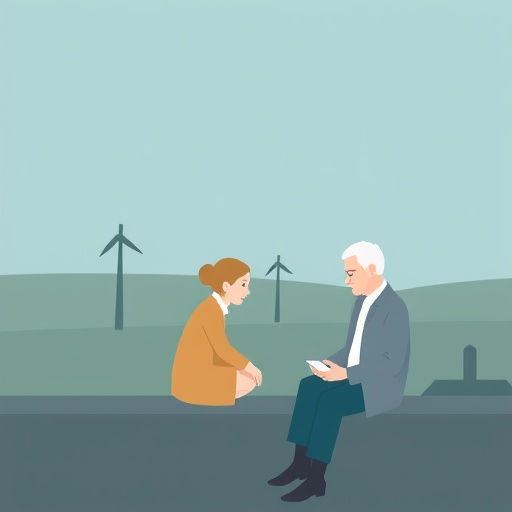Loneliness has increasingly become recognized as a significant public health issue, particularly affecting older adults. Recent research conducted by Mira, Galvão, and Santos sheds light on the intricate relationship between loneliness and healthcare utilization in older populations, specifically within a rural region in Portugal. The study aims to unravel how feelings of isolation and detachment from social circles can be a critical determinant influencing the healthcare behaviors and needs of older adults. As we delve deeper into the findings of this pivotal cross-sectional study, the implications it holds for public health strategies and healthcare systems become increasingly apparent.
In the contemporary understanding of health, psychosocial factors play a crucial role. The authors of the study argue that loneliness is not merely a subjective feeling but a condition that can jeopardize mental and physical health, leading to an uptick in healthcare utilization. This particular study serves as a wake-up call by emphasizing the importance of recognizing loneliness as a detrimental condition that must be addressed within the healthcare arena. One of the key outcomes from the research indicates that older adults who experience loneliness tend to have more frequent interactions with healthcare services, raising questions about the underlying motivations and needs prompting this increased utilization.
The research methodology implemented by Mira and colleagues employs a robust cross-sectional design, providing a snapshot of the elderly population in a rural area of Portugal. This design is particularly advantageous for examining relationships between variables such as loneliness and healthcare use, as it allows for the analysis of a wide array of data collected from a diverse sample. Through structured surveys and assessments, the researchers measured both the subjective feelings of loneliness among participants and their corresponding healthcare interactions. The validity and reliability of the data gathered further bolster the study’s significance in advancing our understanding of aging and health.
An essential finding from the results highlights that older adults grappling with loneliness are likely to experience a decline in overall health, subsequently resulting in higher healthcare demands. This correlation raises critical questions about the need for proactive measures to support mental well-being in seniors. Furthermore, it suggests that healthcare professionals should integrate loneliness assessments as part of routine health evaluations. By identifying individuals who are at risk of social isolation, timely interventions can be administered, potentially alleviating the burden on healthcare systems while enhancing quality of life for older adults.
The implications of this research extend beyond individual health concerns. On a broader scale, addressing loneliness among older adults could significantly reduce healthcare costs. When isolation leads to health complications—such as depression, anxiety, and chronic diseases—the ripple effects can strain healthcare resources. Therefore, by formulating targeted interventions focused on reducing loneliness, healthcare systems have the potential not only to improve patient outcomes but also to economize on healthcare expenditures. This presents a compelling case for investing in social programs and community initiatives aimed at fostering social connections among the elderly.
Furthermore, the study emphasizes the role of community and familial support in mitigating feelings of loneliness. When older adults are embedded within supportive networks—be it family, friends, or community groups—they are less likely to feel isolated. This social connectivity is crucial, as it not only contributes to emotional well-being but also encourages healthier lifestyle choices and reduces the likelihood of chronic diseases. Therefore, promoting social engagement through organized activities, such as clubs, workshops, and volunteering opportunities, is vital in combating loneliness among seniors.
Healthcare systems can also leverage technology to address this pressing issue. With the rise of telehealth and digital communication tools, maintaining social connections has become more feasible than ever before. Older adults can utilize these platforms to connect with peers, partake in virtual communities, and access mental health support from the comfort of their own homes. By embracing technology as a means of fostering relationships, healthcare providers can enhance the quality of life for lonely older adults while also reducing their reliance on traditional healthcare services.
As populations age globally, understanding the dynamics between loneliness and health becomes ever more critical. This research underscores the necessity for a holistic approach to elderly care—one that prioritizes not just physical health but also emotional and social well-being. Policymakers, healthcare professionals, and community leaders must come together to create comprehensive strategies that effectively address the interconnectedness of loneliness and healthcare utilization.
In conclusion, the study by Mira, Galvão, and Santos serves as an enlightening contribution to the discourse on aging and health. The evidence presented calls for immediate action and consideration in how we approach care for older adults. By acknowledging loneliness as a significant determinant of healthcare utilization, we can initiate constructive dialogues aimed at improving the overall well-being of this vulnerable population. Treatment modalities must evolve to include measures that foster social inclusion and emotional support—allowing older adults not only to live longer but to live healthier and happier lives.
For the future, continued research in this domain is paramount. As we endeavor to understand the nuances of loneliness across varying demographics and settings, we can equip ourselves with the knowledge necessary to combat this pervasive issue effectively. The path forward will require innovative thinking, collaborative efforts, and a commitment to transforming the care landscape for older adults, thereby ensuring that no one has to grapple with the challenges of loneliness alone.
Subject of Research: The relationship between loneliness and healthcare utilization in older adults.
Article Title: Loneliness as a determinant of healthcare utilisation in older adults: a cross-sectional study in a Portuguese rural region.
Article References:
Mira, Â., Galvão, C. & Santos, P. Loneliness as a determinant of healthcare utilisation in older adults: a cross-sectional study in a Portuguese rural region. Eur Geriatr Med (2025). https://doi.org/10.1007/s41999-025-01307-8
Image Credits: AI Generated
DOI: https://doi.org/10.1007/s41999-025-01307-8
Keywords: Loneliness, healthcare utilization, older adults, public health, social isolation.




